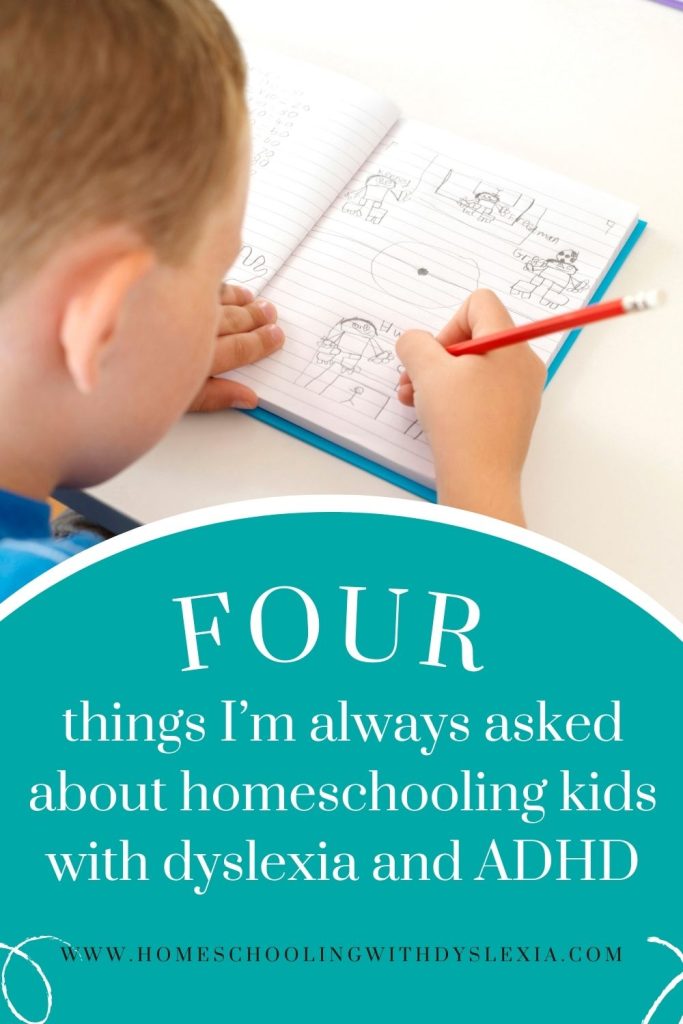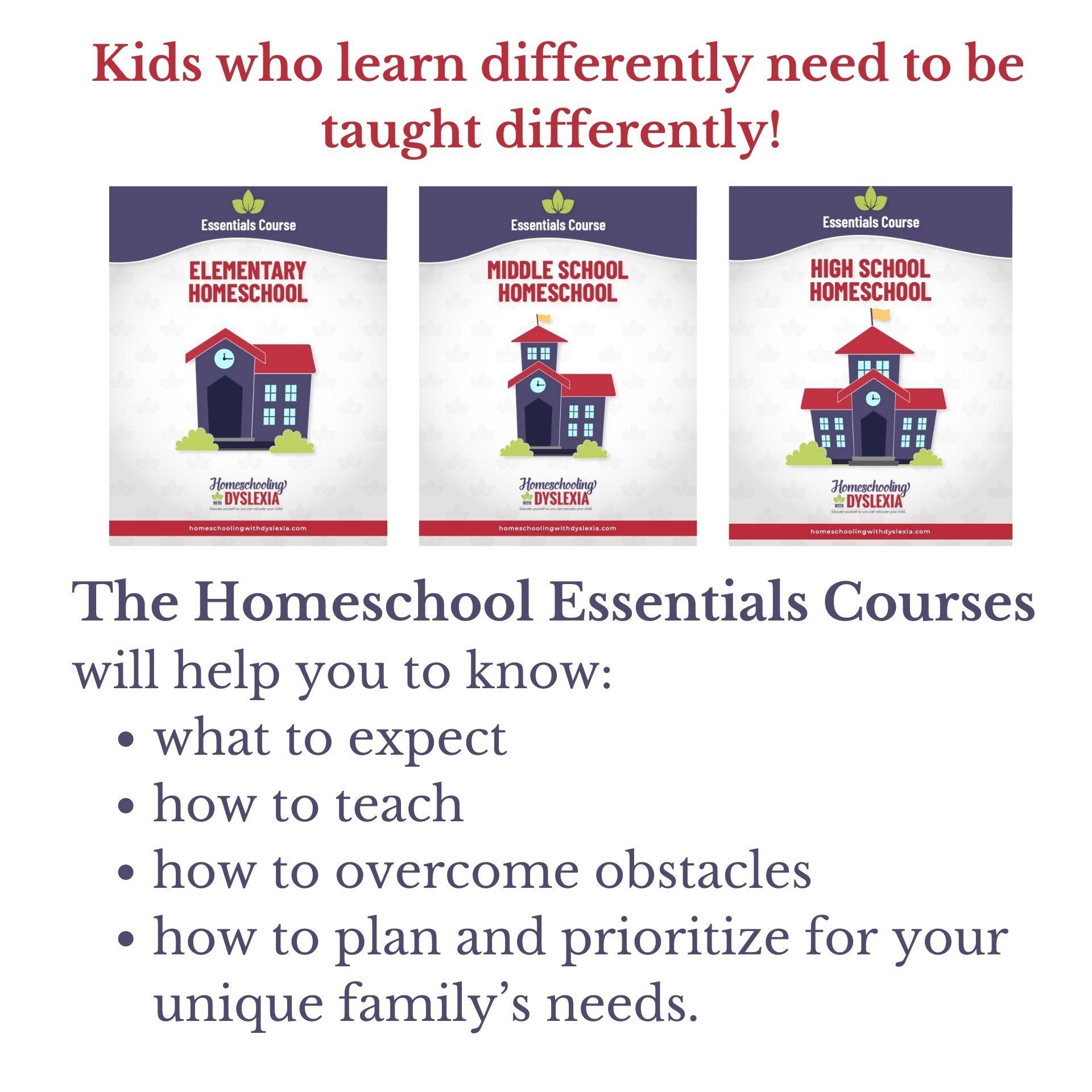One of my favorite things in the whole world is to work one-on-one with my readers to help them navigate the world of homeschooling kids with dyslexia. My goal in running this website is to use my own experience home educating my own kids with dyslexia to help other families who are not so far along in their journey. You can read more about my family’s dyslexia journey here.
Prefer to listen to this post, click on the player below:
As many of us are beginning to prepare to head back to school in the next weeks, I’ve been thinking about what I want you to know before you get started; what I want you to know so you can have one of the best, most peaceful and satisfying school years yet.
I realized that when I talk one-on-one with you guys, I often hear the same 4 questions about homeschooling kids with dyslexia and ADHD.
Common Questions About Homeschooling with Dyslexia and ADHD
Question 1: My kids are behind. How can I catch them up?
Without exception, every parent I speak to about homeschooling their kids with dyslexia and ADHD asks me what to do to help their kids who are behind.
It’s normal to ask this question. The majority of us have only ever known traditional school. So it’s normal for us as homeschooling parents to model our own schools after that institution.
One of the things that I have seen over the course of homeschooling for nearly 30 years and graduating six of my eight kids is that our kids may be behind traditional learners but they are able to get to where they need to go if we teach them how they learn with the right message consistently over time.
This is achieved with a balance of the right types of curriculum, appropriate teaching methods, observing our kids strengths and weaknesses, allowing them to have a voice and some choice, and letting go of arbitrary benchmarks of learning that don’t apply to our kids. It is not achieved by stressing and pounding our ‘square peg’ learners into round holes.
Learn more about the myth of being ‘behind’ by reading this post.
Question 2: How do I teach? Reading, writing, math, spelling, etc
One of the reasons that kids with dyslexia and ADHD struggle so much in the traditional school setting is because the methods used there rely on our kids’ areas of weakness: things like reading, writing (which includes spelling), memory, sitting still, and being a passive receiver of knowledge.
When we bring them home and implement the kinds of teaching that best meets their needs, we begin to see them relax, engage, and learn – slowly but surely.
So for example, a traditional school may teach spelling by using weekly spelling tests. Kids with dyslexia study and study, maybe remembering enough to pass the test but usually not, and always forgetting what they memorized for the test. This is followed by a new set of 20 words the following week. Same goes for grammar and math concepts. Contrast that with how we can teach at home.
Instead of a spelling test that includes 20 words using 5 or 6 ways to spell the long sound of /e/, we teach kids one rule for spelling words with the long /e/ sound.
Kids build the words with letter tiles, saying the sounds as they build. This is multi-sensory learning; using as many of the senses as possible all at once, so in this example, sight, hearing, and touch. Research shows that multi-sensory learning results in much more efficient mastery.
Words and previous rules that have been learned are reviewed regularly, greatly improving the chances of remembering them.

Question 3: Help! My child is resisting.
First of all, most kids will resist school from time to time whether they have dyslexia and ADHD or not. There is no perfect homeschool!
However, the frustration and subsequent anxiety that our kids face when trying to learn with their poor memory and processing lags can build over time to the point of resistance and even outright school refusal.
Parents of kids with dyslexia and ADHD should understand that this is not their fault necessarily and that it can be a normal part of homeschooling struggling learners. What I have seen to be the biggest help is to step outside the box in your homeschool.
What this looks like is maybe taking a break from academics for a time. It might mean allowing them to pursue their interests even if it involves screens before noon. It might mean observing their interests and providing them with opportunities to expand on them. A period of deschooling can be one of the best things we can do for our kids. Science tells us that our brains cannot learn when they are under stress.
This brings me to the fourth thing that people always ask me about homeschooling kids with dyslexia and ADHD.
Question 4: How do I get it all done?
Wrong question. It’s less about getting everything done and more about getting the right things done or knowing your priorities.
Once we begin to have the right expectations for our non-traditional learners,
Once we learn the most effective teaching methods,
Once we learn how to help our kids overcome resistance to learning and actually enjoy learning again,
THEN, we can get the right things done. We can teach with methods that work, while allowing our kids time to pursue things of real interest to them. We can balance time strengthening weaknesses with time building strengths.
When we step outside the box of traditional school expectations, our kids can truly learn and flourish.
Learn more with our Homeschool Essentials Courses
I created an amazing resource that answers these 4 questions in detail through a set of online parent courses called the Homeschool Essentials courses. There is one course for elementary school, middle school, and high school all addressing the unique needs of kids at each of those stages.
If you are committed to home educating your kids with dyslexia and ADHD, these courses will help you get answers to the most common questions about how to have a homeschool that is as peaceful and productive as possible.
Learn more or purchase a Homeschool Essentials Course here







0 Comments